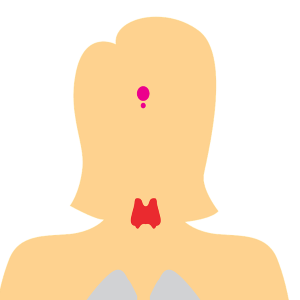Hypothyroidism and Endometriosis
The thyroid gland plays a pivotal role in gynecological conditions. It is not uncommon for women with endometriosis to experience dysfunctions in this butterfly-shaped organ. Instances from real life illustrate that hormonal irregularities can cause disruptions in the menstrual cycle and hinder fertility. Today, I invite you to delve into the realm of hypothyroidism, Together, let us uncover the correlation between hypothyroidism and endometriosis and explore potential implications for endometriosis treatment.
Impact of Thyroid Hormones on the Menstrual Cycle.
The thyroid gland, positioned at the front of the neck, serves as a hormonal hub. Often referred to as the butterfly organ, its lateral lobes bear resemblance to butterfly wings. This gland wields influence over metabolism and undertakes vital regulatory roles within the body [1]. These encompass modulation of the female cycle and reproduction. Consistently, medical professionals note that even minor fluctuations in thyroid function can instigate significant disruption in the menstrual cycle, potentially diminishing fertility. Moreover, hypothyroidism can also impede egg maturation [2].
The two thyroid hormones are:
- Triiodothyronine (thyroxine or T3)
- Tetraiodothyronine (T4)
Good to know!
The thyroid hormones T3 and T4 originate within the follicular epithelial cells within the thyroid gland. The pituitary gland is intricately engaged in their controlled release. It governs the quantity of hormones dispatched from the thyroid gland into the bloodstream [1].
Hypothyroidism and Endometriosis: Unraveling the Possible Link

The thyroid gland is also called the butterfly organ.
According to the US Endometriosis Association, individuals grappling with endometriosis are statistically 6 times more prone to also experiencing hypothyroidism [3]. While the statistic hints at a potential correlation, the precise nature of the link between thyroid disorders and endometriosis remains a subject of ongoing exploration. Scientists have embarked on this journey and have already unveiled some initial and captivating interactions.
- Thyroid hormones influence cell growth and endometrial state [4,5,6].
- In certain endometriosis patients, blood analysis reveals the presence of various antibodies, including those targeting the endometrium. While endometriosis is not classified as an autoimmune disease, intriguing parallels emerge. The disorder notably affects the immune system. Similarly, autoimmune ailments concerning the thyroid gland, like Hashimoto’s thyroiditis or Graves’ disease, share similar characteristics [7,8].
- Endometriosis lesions might react diversely to thyroid hormones coursing through the body. Research indicates distinct thyroid metabolism with these lesions. This divergence could lead to reduced impact of the thyroid hormone T3, potentially resulting in T4 accumulation. This, in turn, could foster increased growth of endometriosis tissue [9].
Navigating Symptom Similarities: Hypothyroidism and Endometriosis
While hypothyroidism and endometriosis are distinct conditions, their symptoms often overlap, warranting meticulous distinction during diagnosis.
The subsequent symptoms are either akin or potentially present in both disorders [10]:
- Menstrual cramps (cycle-dependent bleeding anomalies or pain)
- Constipation
- Fatigue (profound tiredness, lack of vitality)
- Depressed mood
- Fertility issues
- Impaired sleep quality
- Sensations of tingling, numbness, or pain, as observed in the legs
It is important to note that hypothyroidism introduces additional symptoms, such as thyroid gland enlargement, heightened sensitivity to cold, and weight gain.
A Distinct Case: Hashimoto’s Thyroiditis
In around 90% of instances, hypothyroidism stems from Hashimoto’s thyroiditis, an autoimmune disorder that prompts the body to generate defensive agents targeting thyroid components. This process, unfortunately, fuels inflammation in the butterfly organ, ultimately leading to hypothyroidism. Notably, Hashimoto’s thyroiditis is not a rarity; a mild form affects approximately 4.6% of the population, often without noticeable symptoms [11,12]. However, the intriguing nexus between this autoimmune condition and endometriosis warrants exploration. Delving into studies, I have uncovered a fascinating detail: there are observations that indicate a significant correlation between thyroid autoimmune disease and infertility, especially pronounced among women with endometriosis and polycystic ovarian syndrome [13].
The exact reasons for this linkage remain a subject of ongoing research.
Good to know!
In cases of endometriosis, a phenomenon known as estrogen dominance frequently emerges. This denotes an imbalance where excessive female sex hormones – such as estrone and estradiol – are present. Concurrently, a deficiency in progesterone or progesterone resistance often occurs, curbing the full potential of existing progesterone. Significantly, Hashimoto’s thyroid disease is also commonly associated with progesterone deficiency. Notably, both endometriosis and hypothyroidism are managed using treatments that impact progesterone levels [14,15].
Monitoring Thyroid Levels: A Prudent Approach in Endometriosis
In instances of hypothyroidism, the body produces insufficient thyroid hormone, a factor that can notably impact fertility. Considering that women with endometriosis frequently grapple with unrealized aspirations of parenthood, the coexistence of hypothyroidism could further diminish the prospects of conception. Encouragingly, hypothyroidism is manageable. The absent thyroid hormone, T3, can be supplemented through medication. However, achieving hormonal equilibrium generally takes about 3 months. Treatment may span phases or endure lifelong, contingent on the underlying cause. Possible nervous system manifestations could arise as a side effect, particularly if dosages are excessive. This underscores the imperative of routine thyroid value assessments (approximately annually, with heightened frequency initially) and, when warranted, dose adjustments during thyroid medication administration
In a Nutshell
The unequivocal influence of thyroid hormones on the female cycle and fertility is undeniable. Notably, emerging research suggests their pivotal role in the realm of endometriosis. For instance, these hormones wield the potential to shape cell growth and bolster endometrial well-being. Furthermore, investigations highlight differential thyroid metabolism within endometriosis lesions, potentially fueling heightened tissue growth. Of particular note, Hashimoto’s thyroiditis, an autoimmune affliction affecting the thyroid gland, induces hypoactivity of the butterfly organ. Remarkably, akin to endometriosis, it is also linked to progesterone deficiency. Intriguingly, the administration of progesterone has demonstrated the capacity to ameliorate thyroid levels in numerous cases [14]. In the context of endometriosis, progestin administration stands as the preferred therapeutic choice [16]. Worth mentioning, the sex hormone progesterone, a member of the progestin group, can be administered in synthetic form.
Collectively, these multifarious findings unveil captivating parallels between hypothyroidism and endometriosis, urging further exploration in forthcoming studies.
References
- Foundation for Quality and Efficiency in Health Care Wie funktioniert die Schilddrüse? | Gesundheitsinformation.de
- Fertility Center Nuremberg. Die Schilddrüse als gynäkologisches Schlüsselorgan (ivf-nuernberg.de)
- Sinaii N, Cleary SD, Ballweg ML, Nieman LK, Stratton P. High rates of autoimmune and endocrine disorders, fibromyalgia, chronic fatigue syndrome and atopic diseases among women with endometriosis: a survey analysis. Hum Reprod. 2002 Oct;17(10):2715-24. doi: 10.1093/humrep/17.10.2715. PMID: 12351553.
- Taylor LJ, Jackson TL, Reid JG, Duffy SR. The differential expression of oestrogen receptors, progesterone receptors, Bcl-2 and Ki67 in endometrial polyps. BJOG. 2003 Sep;110(9):794-8. PMID: 14511960.
- Scoccia B, Demir H, Kang Y, Fierro MA, Winston NJ. In vitro fertilization pregnancy rates in levothyroxine-treated women with hypothyroidism compared to women without thyroid dysfunction disorders. Thyroid. 2012 Jun;22(6):631-6. doi: 10.1089/thy.2011.0343. Epub 2012 Apr 27. PMID: 22540326; PMCID: PMC3412578.
- Aghajanova L, Stavreus-Evers A, Lindeberg M, Landgren BM, Sparre LS, Hovatta O. Thyroid-stimulating hormone receptor and thyroid hormone receptors are involved in human endometrial physiology. Fertil Steril. 2011 Jan;95(1):230-7, 237.e1-2. doi: 10.1016/j.fertnstert.2010.06.079. Epub 2010 Aug 5. PMID: 20691434.
- Nothnick WB. Treating endometriosis as an autoimmune disease. Fertil Steril. 2001 Aug;76(2):223-31. doi: 10.1016/s0015-0282(01)01878-7. PMID: 11476764.
- Martin Sillem: Endometriosis: benign but mean: recognizing the hidden disease and treating it effectively, Georg Thieme Verlag, 2003.
- Peyneau M. et al. Role of thyroid dysimmunity and thyroid hormones in endometriosis. PNAS June 11, 2019 116 (24) 11894-11899; first published May 29, 2019; https://doi.org/10.1073/pnas.1820469116
- Foundation for Quality and Efficiency in Health Care. Schilddrüsenunterfunktion (Hypothyreose) (gesundheitsinformation.de)
- Joseph G. Hollowell, Norman W. Staehling, W. Dana Flanders, W. Harry Hannon, Elaine W. Gunter, Carole A. Spencer, Lewis E. Braverman, Serum TSH, T4, and Thyroid Antibodies in the United States Population (1988 to 1994): National Health and Nutrition Examination Survey (NHANES III), The Journal of Clinical Endocrinology & Metabolism, Volume 87, Issue 2, 1 February 2002, Pages 489–499, https://doi.org/10.1210/jcem.87.2.8182
- Deutsches Schilddrüsenzentrum GmbH. Entzündungen und Hashimoto – Deutsches Schilddrüsenzentrum (deutsches-schilddruesenzentrum.de)
- Poppe K, Glinoer D, Tournaye H, Devroey P, Schiettecatte J, Haentjens P, Velkeniers B. Thyroid autoimmunity and female infertility. Verh K Acad Geneeskd Belg. 2006;68(5-6):357-77. PMID: 17313094.
- Prof. Dr. Ingrid Gerhard. Endometriosis and environmental factors interview with Prof. Dr. Schulte- Übbing. Jul 23, 2011 | endometriosis, nutrition, hormone disorders, environment. Endometriose und Umweltfaktoren-Prof. Dr. Schulte-Übbing | Netzwerk Frauengesundheit – Ratgeber für Frauenheilkunde (netzwerk-frauengesundheit.com)
- Prof. Dr. Schulte-Uebbing. Hashimoto Thyreoiditis, Östrogen-Dominanz
und Progesteron-Mangel. Hashimoto Thyreoiditis, Östrogen-Dominanz und Progesteron-Mangel (dr-schulte-uebbing.de) - 015/045 – Diagnostik und Therapie der Endometriose (awmf.org)
- Pharmaceutical Companies and Their Influence on Scientific Research - 7. October 2023
- Identification of a Genetic Factor Linked to Endometriosis Development and Potential Therapeutic Targets - 6. October 2023
- Identification of a Genetic Factor Linked to Endometriosis Development and Potential Therapeutic Targets - 6. October 2023


